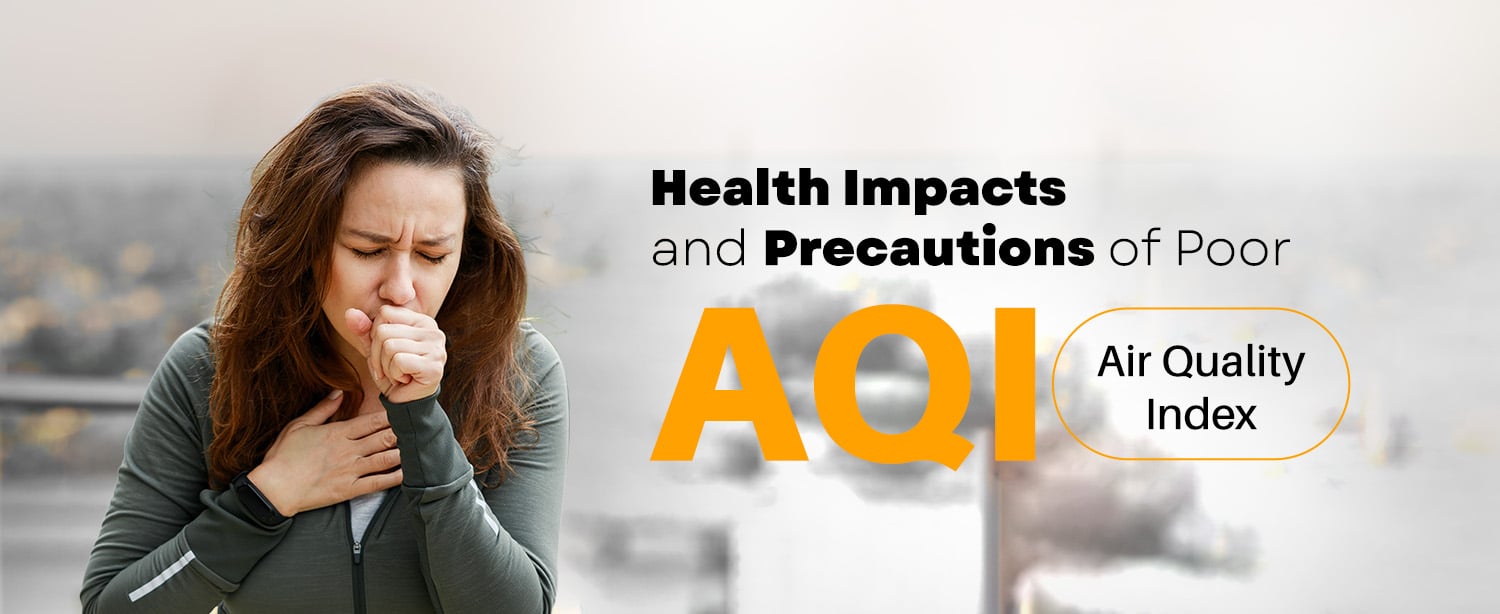As winter descends across much of India, the Air Quality Index (AQI) in urban areas plummets, bringing with it a host of health risks. The AQI serves as a critical indicator of air pollution levels, providing an understanding of how safe – or hazardous – the air is for daily activities. Poor AQI is more than just an environmental issue; it is a pressing public health concern.
Table of Contents
Understanding AQI and Its Health Implications
The AQI measures pollutants such as particulate matter (PM2.5 and PM10), ozone, nitrogen dioxide, sulfur dioxide, and carbon monoxide. Here’s what the AQI levels typically indicate:
- Good (0–50): Air quality is safe for everyone.
- Moderate (51–100): Acceptable air quality with minor risks for sensitive groups.
- Unhealthy for Sensitive Groups (101–150): People with respiratory or heart conditions may experience mild symptoms.
- Unhealthy (151–200): Health effects are more noticeable in the general population.
- Very Unhealthy (201–300): Serious health risks for everyone.
- Hazardous (>300): Emergency health warnings, with the entire population at risk.
The northern regions of India, including Delhi and its surrounding areas, frequently experience AQI levels in the “Very Unhealthy” or “Hazardous” categories during winter. However,off late Mumbai is also seeing poor AQI levels especially in the winters.
High-Risk Groups and Commonly Triggered Conditions
Certain groups are more susceptible to the health effects of poor AQI. These include:
- Children and Adolescents: Their developing lungs make them vulnerable to long-term damage.
- Elderly Individuals: Existing health conditions, such as heart disease, amplify risks.
- Pregnant Women: Poor air quality can impact both the mother and the unborn child.
- Outdoor Workers: Prolonged exposure heightens their risk of respiratory and cardiovascular conditions.
- People with Pre-existing Conditions: Asthma, chronic obstructive pulmonary disease (COPD), and diabetes make individuals more susceptible to complications.
Common Health Issues
- Respiratory Problems: Increased coughing, wheezing, and shortness of breath.
- Cardiovascular Strain: Elevated blood pressure and a higher risk of heart attacks.
- Aggravated Chronic Conditions: Exacerbation of asthma and COPD.
- Infections: Higher vulnerability to viral and bacterial respiratory infections due to weakened defenses.
Precautions to Safeguard your Health
It is important to lead a healthy lifestyle and follow these expert recommended suggestions to protect your lungs:
- Limit Outdoor Exposure
- Avoid outdoor activities such as walking, jogging or cycling during early mornings and evenings.
- For essential outings, wear N95 or K95 masks to filter harmful particles.
- Create a Safe Indoor Environment
- Seal your home: Keep windows and doors shut to minimize pollutant entry.
- Use air purifiers: Choose devices with HEPA filters to remove PM2.5 and other harmful particles.
- Monitor indoor air quality: Devices that track pollutants and humidity can guide ventilation needs.
- Improve Ventilation Without Compromising Safety
- Ventilate your home during midday hours (typically 12 PM–4 PM) when outdoor air quality is relatively better.
- Use exhaust fans in kitchens and bathrooms to reduce indoor air pollutants.
- Avoid Polluting Activities Indoors
- Refrain from using biomass fuels for cooking or heating. Switch to cleaner energy sources like gas or electricity.
- Minimize the use of harsh cleaning agents that release volatile organic compounds (VOCs).
- Protect Respiratory Health
- Stay hydrated to keep mucous membranes moist and effective in trapping pollutants.
- If you have respiratory conditions, use prescribed inhalers regularly and follow your treatment plan.
- Pay Attention to Nutrition
- Consume foods rich in antioxidants, such as fruits, vegetables, and omega-3 fatty acids, to combat inflammation.
- Vitamin C, Vitamin E, and magnesium-rich diets can improve lung health.
- Regular Cleaning Practices
- Use vacuum cleaners with HEPA filters to trap dust and allergens.
- Dust surfaces with the use of a microfiber cloth to avoid dispersal of particles into the air.
- Stay Informed
- Keep track of daily AQI levels through apps or websites.
- Follow government advisories and adapt your activities accordingly.
- Seek Medical Attention
- Do not ignore symptoms such as persistent cough, difficulty breathing, chest pain, or dizziness.
- Regular check-ups with a pulmonologist can help manage and mitigate long-term health effects of pollution.
Poor AQI is a reality for many cities in India, especially during the winter months. Understanding its health implications and taking proactive measures can significantly reduce the risks associated with air pollution. By staying informed, creating a safe indoor environment, and adopting healthy habits, you can protect yourself and your loved ones.
Respiratory Care at Kokilaben Dhirubhai Ambani Hospital
Experts at our Department of Pulmonary Medicine strongly encourage everyone to prioritize their health during the winter season. Small steps taken today can prevent significant health challenges tomorrow. If you are suffering from asthma, COPD or any other respiratory illnesses that aggravate due to the high pollution levels, do seek prompt medical care at our hospital. Please find the below link to our website: https://www.kokilabenhospital.com/departments/clinicaldepartments/pulmonarymedicine.html


